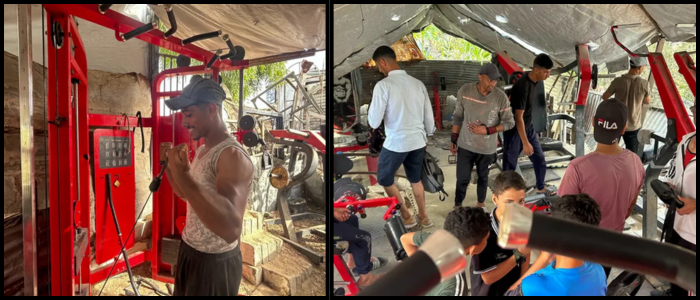Since March, Youssef has lost 14 kilograms, with his weight falling from 72 kilograms to 58 as supplies of food became virtually impossible to find. "If eating has become a freakish thing in Gaza, exercising is at least one odd way to feel normal," he said. His story reflects the fate of 2.1 million Palestinians across the Strip who are unable to feed themselves, said Oxfam, buried under the weight of a crisis that leaves almost all of them struggling with starvation.
Although aid trucks have occasionally been admitted through highly controlled crossings, destruction and military operations have prevented their distribution, and most families cannot get the food they need. (Sealed borders mean that millions of tonnes of supplies remain stuck.)
A Tent Gym for Survival
The gym where Youssef practices was constructed in a tent in al-Mawasi, one of the so-called safe zones now overfilled with roughly one million displaced Palestinians. The gym was established by coach Adly al-Assar, a 55-year-old international powerlifting champion who won six Arab gold medals between 2020 and 2021. He managed to recover 10 pieces of equipment from over 30 after his gym in Khan Younis was destroyed.
Al-Assar himself has lost 11 kilogrammes, from 78kg to 67kg. "Athletes lost their weight as well as lifting power by 10-15 kilograms," he said. "My shoulder muscle was 40 centimetres, now it's under 35." Before the war, more than 200 athletes worked out in his gym every day. Today, only about 10 percent still try workouts, at most once or twice a week.
One of these is Ali al-Azraq, who at 20 saw his bodyweight fall from 79kg to 68kg, nearly all of it muscle. His bench press dropped to just 30kgs from 100kgs, and back lifts fell to 60 kgs from 150kgs. He depicts a life surviving on occasional scraps of bread, rice or pasta, while weaning on protein, meat, or vegetables aren't there at all.
Training Through Trauma and Loss
For many, the tent gym is just more than a place to exercise — it is a sanctuary from trauma. Khaled Al-Bahabsa, 29, who was wounded by Israeli shelling in April, came back to work, even though he still wears shrapnel in his chest. "Sports are life and psychological comfort. Returning to training, "I had a feeling of being closer to the living than the dead," he said.
It has been a catastrophe for Gaza. More than 22 months into the bombardment, over 62,000 people have been killed, and most of the population has been displaced. Now, hunger is all over with bodybuilders adjusting workouts. Training is trimmed to a mere 30 minutes; rest intervals are longer, and weights are lighter. Even though fainting, collapsing, and exhaustion are typical, athletes still come.
For Youssef, a former bodybuilding champion who was training for a competition before the war, his dreams have been dashed, but he refuses to give up. "Despite the hunger, I didn't lose hope and trained again to get back to my level," he said.
Al-Assar doesn't see the training tent as just an exercise. "This is a notion here that's beyond training," he said. "It's about us seeking the life we want to live in safety and peace. Gaza, its life and people, will not stop moving on, even if in ruins. "Sports are one part of this life."
World

Gaza Bodybuilders Struggle to Stay Strong Amid Famine

In the Gaza Strip's al-Mawasi, bodybuilders are struggling to retain their strength despite the extreme hunger that has followed the nine-year siege. Young men like Tareq Abu Youssef, 23, work out with less intensity, in a tent gym filled with salvaged equipment, trying to keep what is left of their muscles.















